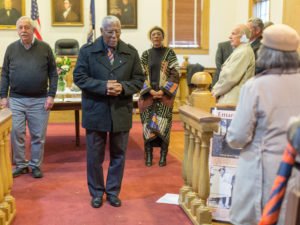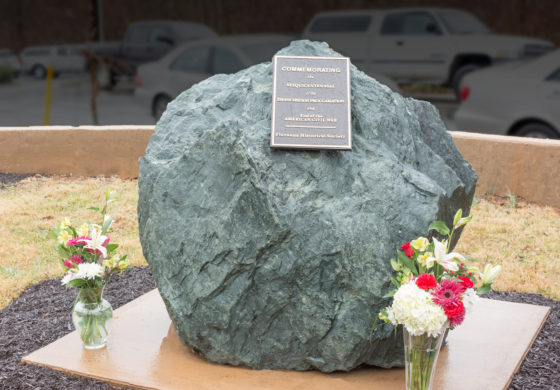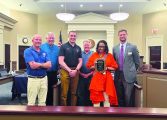By Heather Michon
Correspondent
Dozens braved the cold and rain on Abraham Lincoln’s 210th birthday (Feb. 12) to celebrate the dedication of a new monument to his most enduring accomplishment: the Emancipation Proclamation.
Sitting at the edge of Civil War Park in the Historic Village of Palmyra within sight of the monument to Fluvanna’s Confederate soldiers, a plaque mounted to a large stone recognizes the 1863 signing of the proclamation and the end of the Civil War in 1865.
Members of the Board of Supervisors, county officials, Fluvanna Historical Society members, local clergy, and others gathered under a tent as the Rev. Phillip Carter delivered the opening prayer and historical society President Marvin Moss gave opening remarks.
 As the rain picked up, the event moved into the Historic Courthouse. Highlights of the hour-long commemoration included a reading of the Emancipation Proclamation by local NAACP chapter president Ben Hudson, a letter of congratulations from Sen. Mark Warner, and a talk by Commonwealth’s Attorney Jeff Haislip on legal efforts to overcome the past and create a more equitable justice system.
As the rain picked up, the event moved into the Historic Courthouse. Highlights of the hour-long commemoration included a reading of the Emancipation Proclamation by local NAACP chapter president Ben Hudson, a letter of congratulations from Sen. Mark Warner, and a talk by Commonwealth’s Attorney Jeff Haislip on legal efforts to overcome the past and create a more equitable justice system.
This was a celebration not just of the monument, but of the successful end of years of debate and planning.
Supervisor Mozell Booker, historical society director Tricia Johnson, and publications editor David Bearr talked about the effort during their remarks.
 In 2015, new county signage identified the square in the village of Palmyra as “Confederate Park.”
In 2015, new county signage identified the square in the village of Palmyra as “Confederate Park.”
“We needed to change the name,” said Booker.
Not everyone had agreed on that point, with 61 percent of county residents surveyed initially wanting to keep the original name. During that period, Booker said her inbox filled with vitriolic emails, “some so bad I couldn’t even read them,” she said.
Booker remained undaunted: “I preached what I felt and why I felt it.”
In September 2015 the square was officially renamed “Civil War Park.”
Combined with the 150thanniversary commemorations of the Civil War, the debate over the park’s name sparked community interest in broadening Fluvanna’s interpretation of that era.
“We needed to tell the rest of the story,” said David Bearr, “and the park wasn’t doing that.”
Eventually, these discussions crystallized into a monument celebrating the signing of the Emancipation Proclamation and the end of the Civil War.
Lincoln’s 1863 proclamation granted freedom to about 3.5 million slaves held in 10 breakaway Southern states, but it was only enforceable in areas in which Union armies had control.
For Fluvanna’s approximately 5,000 enslaved residents, freedom wouldn’t come for another two long years – and that was only the beginning of a journey toward racial justice that continues to this day.
Tuesday’s celebrations marked a new phase for the little town square. “There’s more history that needs to go in that park,” Booker said, envisioning more monuments recognizing Fluvanna’s part in other conflicts and interpretive signs to tell Fluvanna’s full story.
As the last few years have shown, revisiting the past can be a painful discussion for the community, but after over 150 years, it’s time to have it.
“It is not a taboo subject anymore,” Booker said.





